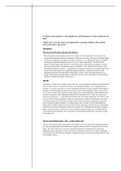6. What, in your opinion, is the significance of Shakespeare's choice of title for the
play?
· Make sure to use the notes you prepared for a question similar to this and the
notes below plus critical text.
Introduction
The relevance of the title of the play, The Winter’s
* title of the play took the debate in favour of ‘romance’ four, by definition, winter’s tales were
strange and fanciful oral narratives intended to while away the long, cold hours of the dark nights
of winter and, therefore, not meant to be taken seriously or two withstand the rigours of logical
interrogation. Mamillius himself specifies a story of “sprites and goblins” suitable for idle
pastime. That the place first reference to such a tell occurs in the domestic company of woman
and is put in the mouth of the androgynous my Mamillius – still “unbreeched” and who’s name
etymologically denotes ‘breasts’ – is significant, for this type of narrative in the patriarchal culture
of the early modern period was traditionally gendered female. Unlike the most serious and
disciplined classical works learned in the grammar schools, where boys begin the process of
sharply defining the masculine identity, effeminate oral tales were considered trivial and inferior,
therefore, probably left behind in the nursery.
The title
The phrase a “winter’s tale” means an old wives’ tale, a story narrated to children in the night before
they go to bed. It can be connected with some ancient legend or ballad, often exaggerated by the
narrator, or it can be a fairy-tale or a story concerned with ghosts. Sicilia’s young heir Mamillius in
the play is fond of hearing such stories. In Act II, he says to his mother that a tragic story is better
for a winter’s evening. Such stories are often illogical, full of improbabilities, supernaturalism and
wonders or fantastic events. Mamillius, himself, starts narrating a story, “There was a man who
dwelt by a Churchyard …” Coleridge believed that in the second part of the play. The Winter’s Tale
in Act IV and V, the play describes a tale fit for a long winter evening. While another critic points
out that the tragic story of the play involving Leontes’ irrational jealousy, resulting in unjust and
cruel treatment of Queen Hermione is a fitting winter’s tale. The play is full of improbabilities,
unbelievable, incidents and flouts unities in the structure of the play. The tale has also supernatural
and fairy-tale wonders and romantic scenes like a winter’s tale. Shakespeare introduces imaginary
details in the play, just as an old wives’ story in which the heroine is put to a lot of difficulties or
chilly situations but ultimately she is successful in surmounting her difficulties and meets a happy
or fortunate end.
The use of the definite article “The” – is this Leontes’ tale?
The use of the definite article and the place title further is the sense that what is being dramatised is
not only the quintessential concentration of a romantic fancy but also the ‘essential story of winter
itself’. The ‘tale’ of the text as we have it need not necessarily correspond to the actual story
Mamillius starts to tell about a man who dwelt by the churchyard, but a loose relation is probable:
the sad wintry tale of the first part (tragedy) completed by the (overall) joyous spring-like tale of the
second half (comedy).
, The Tale - “a sad tale’s best for winter.”
- The idea of tales and what they represented then to an Elizabethan audience.
- To what extent is Leontes’ change and regeneration like a “tale?” Does it appear realistic? Is it
dramatic? What elements of the plot make it seem “tale-like?”
- Tales can also be hybrid forms, often collected from different stories passed down – The Winter’s
Tale is a pastiche of various other stories (Ovid’ Metamorphosis, Proserpina, Biblical stories and
scenes, Pandosto The Triumph of Time).
- Elements of tales and fairy tales usually contain the ethereal and unbelievable, here we have:
Reincarnation / resurrection
The ghost of Hermione
References to mythical animals who celebrated in the festival of Act 4
Allusions to Gods, Goddesses and ideas of Metamorphosis.
Conclusion
Shakespeare named his famous tragedies after the names of main characters like Othello, Macbeth.
Hamlet. Antony and Cleopatra, but in his comedies adopted phrases, ‘Much Ado’, Mid Summer
Night’s Dream and The Winter’s Tale which provide the reader play’s theme or atmosphere. The
Winter’s Tale thus is a correct title giving the substance of the play and its construction as new
drama or tragi-comedy or a romance different from his earlier comedies and famous tragedies—a
romance with the theme of forgiveness and reconciliation.
————————————————————————————————————————
The Tale - “a sad tale’s best for winter.”
- The idea of tales and what they represented then to an Elizabethan audience.
- The recurring idea of tale throughout the play – references and started by Mamillius (he begins the
tale) and then later, in Act 5, we have further references to this.
- To what extent is Leontes’ change and regeneration like a “tale?” Does it appear realistic? Is it
dramatic? What elements of the plot make it seem “tale-like?”
- Tales have a moral message – what are the moral messages reflected and represented throughout
the play.
- Tales contain good/evil characters as well as other binary opposites – consider how this is shown.
- Tales can also be hybrid forms, often collected from different stories passed down – The Winter’s
Tale is a pastiche of various other stories (Ovid’ Metamorphosis, Proserpina, Biblical stories and
scenes, Pandosto The Triumph of Time).





